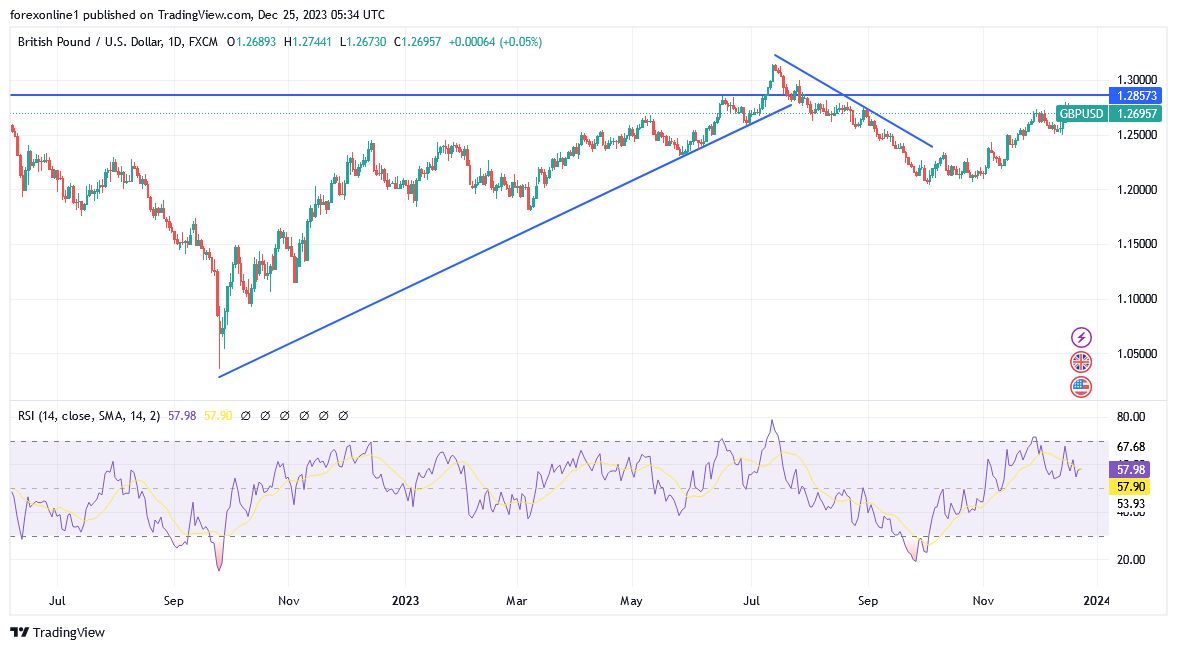 Photo by on
Photo by on
The price of the is trying to maintain the resistance level of 1.2700, which confirms the bulls’ control of the trend. Its gains last week reached the resistance level of 1.2762, but the weakness of the recent British economic data weakened the pound’s movement higher. At the beginning of the holiday week, GBP/USD is stabilizing around the resistance level of 1.2700, awaiting any new developments. On the economic front, the slowdown in inflation has begun to manifest in the United Kingdom, reaching its peak in the December inflation release, which showed a significant deceleration from November. Consequently, markets have strengthened bets on interest rate cuts, and the had the second-worst performance among the G10 currencies when examined over the past month. However, the British currency remains the second-best performer in the G10 for the year 2023, with a few trading days still remaining. At the end of last week, it was announced that economic output in the United Kingdom had contracted in the third quarter, indicating that the British economy is heading towards a moderate recession towards the end of the year. For its part, the Office for National Statistics reported on Friday that gross domestic product contracted by 0.1 percent sequentially in the third quarter, which was revised down from flat growth initially estimated. Also, the Office for National Statistics revised second-quarter GDP to show no growth from the previously estimated increase of 0.2 percent. In terms of production, the data showed that there was a 0.2 percent decrease in the services sector, which offset a 0.4 percent increase in construction production and a 0.1 percent increase in the production sector. furthermore, a breakdown of the expenditure side showed that the decline in business investment and household spending was partly offset by an increase in government spending and the volume of international trade flows. Moreover, household consumption contracted by 0.5 percent in the third quarter. Obviously, this decrease largely reflects lower spending on various goods and services, and spending on restaurants and hotels. As well, thanks to higher spending on public administration and defense, government consumption rose by 0.8 percent. Also, Gross fixed capital formation decreased by 1.6%, mainly due to a decrease in business investment by 3.2%. Over and above that, the data also showed that the trade deficit in goods and services reached 0.8 percent of nominal GDP. Commenting on the numbers. Ashley Webb, an economist at Capital Economics, said the latest release suggests the UK economy was slightly weaker than previously thought in the third quarter, and a moderate recession may have begun. Recently, the economist added that the latest activity surveys indicate weak GDP growth in the fourth quarter as well. The Confederation of British Industry’s growth index on Friday also showed that private sector activity fell slightly in the three months to December. Now, this decline has extended for a year and a half without growth. Companies expect this trend to continue in the new year.
GBPUSD Expectations and Analysis Today: GBP/USD forecasts for the pound against the US dollar, according to the performance on the daily chart below, show that it is still moving within an upward channel. Recently, that was formed in reaction to signals from global central banks in their last meetings in the year 2023. However, the British economic weakness still prevents a new strong upward move for the pound sterling against the rest of the currencies. Technically, Bulls still need to break the resistance levels of 1.2785 and 1.2850, respectively. To confirm control, and the last level increases the talk towards the next psychological resistance, 1.3000. On the other hand, over the same time period, a return to the support level of 1.2580 will be important for the bears to start controlling the trend. Almost non-existent movements are expected today in light of the market and bank holidays on the occasion of Christmas. Throughout this week, limited movements are expected in light of investors’ reluctance to leave the markets during the holidays, which affects liquidity. (Click on image to enlarge) More By This Author:
More By This Author:
GBP/USD Analysis: Bulls In Control, Waiting For Stimulus

